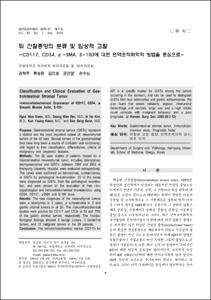위 간질종양의 분류 및 임상적 고찰 -CD117, CD34, α-SMA, S-100에 대한 면역조직화학적 방법을 중심으로-
- Keimyung Author(s)
- Ryu, Seung Wan; Kim, In Ho; Sohn, Soo Sang; Kwon, Kun Young
- Journal Title
- 대한외과학회지
- Issued Date
- 2003
- Volume
- 65
- Issue
- 1
- Abstract
- Purpose: Gastrointestinal stromal tumors (GISTs) represent a distinct and the most important subset of, mesenchymal tumors of the GI tract. Stromal tumors of the gastrointestinal tract have long been a source of confusion and controversy, with regard to their classification, differentiation, criteria of malignancy and prognostic features.
Methods: The 26 case studies of patients treated for a Gastrointestinal mesenchymal tumor, including leiomyomas, leiomyosarcomas and GISTs, between 1994 and 2002 at Keimyung University Hospital, were evaluated retrospectively. The cases were confirmed as leiomyomas, schwannomas, or GISTs by pathological re-examination. 20 of the cases were diagnosed as GISTs, from the pathological examination, and were chosen for the evaluation of their clinicopathological and immunohistochemical characteristics, using CD34, CD117, -SMA and S-100 done.
Results: The new diagnoses of the mesenchymal tumors were a leiomyoma in 3 cases, a schwannoma in 3 and gastric stromal tumors in all 20. The immunohistochemical studies were positive for CD117 and CD34 in 95 and 75% of the gastric stromal tumors, respectively. The histopathological findings showed 5 benign tumors, 3 borderline tumors, and 12 malignant tumors in the 20 patients.
Conclusion: The immunohistochemical marker (CD117) for KIT is a specific marker for GISTs among the tumors occurring in the stomach, and can be used to distinguish GISTs from true leiomyomas and gastric schwannomas. We also found that severe cellularity, atypism, intratumoral hemorrhage and necrosis, large size and a high mitotic count correlate with malignant behaviour and a poor prognosis.
- Alternative Title
- Classification and Clinical Evaluation of Gastrointestinal Stromal Tumor -Immunohistochemical Expression of CD117, CD34, α-Smooth Muscle Actin, S-100-
- Publisher
- School of Medicine
- Citation
- 권혁우 et al. (2003). 위 간질종양의 분류 및 임상적 고찰 -CD117, CD34, α-SMA, S-100에 대한 면역조직화학적 방법을 중심으로-. 대한외과학회지, 65(1), 7–12.
- Type
- Article
- ISSN
- 1226-0053
- Appears in Collections:
- 1. School of Medicine (의과대학) > Dept. of Pathology (병리학)
1. School of Medicine (의과대학) > Dept. of Surgery (외과학)
- 파일 목록
-
-
Download
 oak-bbb-02971.pdf
기타 데이터 / 284.96 kB / Adobe PDF
oak-bbb-02971.pdf
기타 데이터 / 284.96 kB / Adobe PDF
-
Items in Repository are protected by copyright, with all rights reserved, unless otherwise indicated.